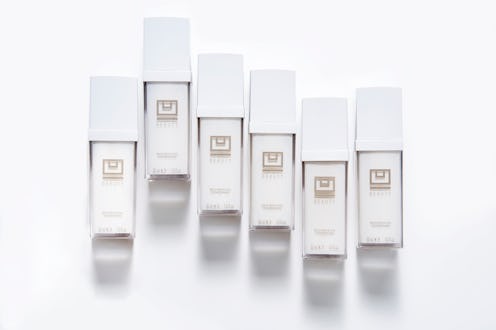(Beauty)
10 Multi-Use Skin Care Products For A Minimal (But Effective) Routine

I used to be that girl whose skin care routine legit included 20 steps. I took pride in not only the amount of products that brimmed over in my medicine cabinet, but also in the fact that I simply felt more knowledgable about skin due to my time-consuming habit. However, when quarantine began, the energy and fervor I once had for being a skin care aficionado of sorts fell by the wayside, and my routine became marked by laziness rather than ardor. It was then that I began to explore multi-use skin care, and haven't turned back since.
For those unfamiliar with what multi-use skin care is, the name is pretty self-explanatory. It implies a singular product that shells out the benefits of a multitude of other products. Think a toner, essence, retinol hybrid, or a moisturizer and vitamin C treatment combined. They're made with the intent of taking the steps out of skin care and to demystify your routine. And while they're not particularly new to the market, given the climate of the time, they're finally having their moment.
Ahead, check out what the experts have to say about the efficacy of these multi-use formulas, and find out the combinations you should be on the lookout for before pressing the buy button.
Multi-Use Skin Care: Why The Surge?
"As more information becomes available to people, it’s become clear that more isn’t better," Tina Craig, founder of U-Beauty, tells TZR. "For a long time, we were convinced that the more individual products we used, with each of them serving a different purpose, the better our skin would be. But now, the veil has been lifted. People, myself included, are interested in clean multitasking products that are both time- and cost-effective. Think more sustainability and less waste."
Multi-Use Skin Care: Do They Actually Work?
According to Dr. Ted Lain, board-certified dermatologist and chief medical officer at Sanova Dermatology, he can't speak to the actual efficacy of all multi-use skin care products as a whole. However, he says that using products that make these promises is not likely harmful to the skin. But like any other skin care product, balance is key. "As long as the formulation maintains stability of all ingredients, your skin should be fine," he says. He also says that it's important to not be fooled, citing essence as a product that can often be used too broadly. "The term 'essence' is not well defined and therefore can be applied to a multitude of formulations, including mists and light serums," he says. "It is a term meant more for marketing than for scientific purposes. Therefore, hybrid products containing essences and another type of serum or lotion will likely not do more than a single product alone."
Lain also concurs with Craig that multi-use skin care is made to create a more cost-effective lifestyle, and therefore warns against price gouging. "If the price point is higher because of this marketing jargon of 'multi-use,' then I would recommend being leery," he says.
That's why, when Craig was formulating her now sought-after Resurfacing Compound, she made sure that it actually did what it promised and was cost-effective. "The product replaces at least six other products," Craig says. "That includes toner, retinol, multi-hydroxy acids, vitamins C, A, and E and brighteners. In one step, it visibly resurfaces, brightens, tightens, tones, equalizes and defends your skin against environmental aggressors, neutralizing free radicals."
Multi-Use Skin Care: How To Use
The point of multi-use products is to simplify, so when using, you should be doing just that. However, pay attention to what products you use alongside them. "Follow the instructions, as they’ve been strategically designed for optimal effect and don’t use other products with super-actives to avoid overloading your skin," Craig says.
We only include products that have been independently selected by The Zoe Report's editorial team. However, we may receive a portion of sales if you purchase a product through a link in this article.
Shop Multi-Use Skin Care:
This article was originally published on